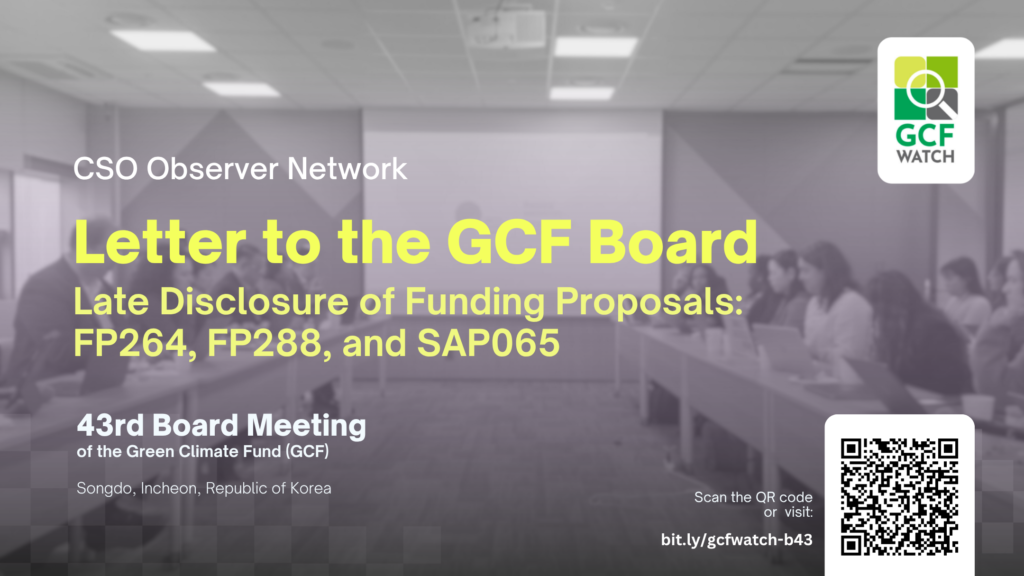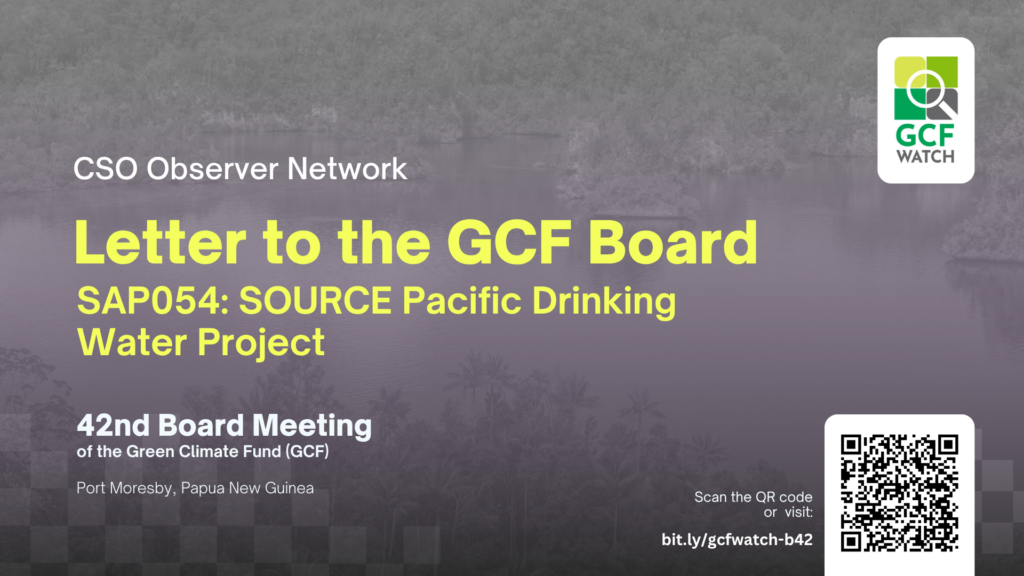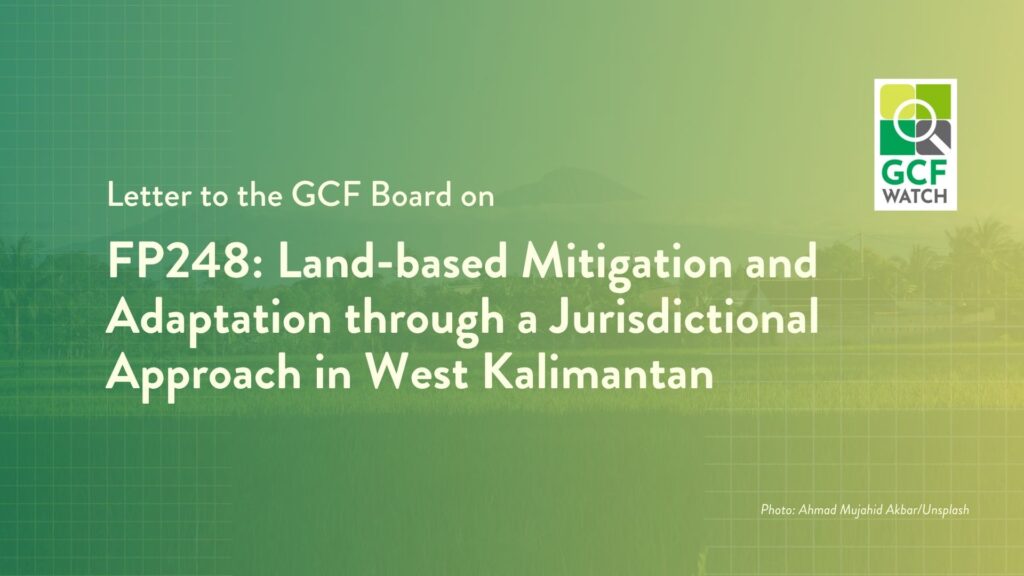CSO Update on the 35th Green Climate Fund Board Meeting – Day 4 (16 March 2023)
 From the The Asian Peoples’ Movement on Debt and Development (APMDD)
From the The Asian Peoples’ Movement on Debt and Development (APMDD)
DAY 4 – 16 March 2023
For the complete text of the interventions delivered by CSO AOs, see this link.
Day 4 opened with the Board’s discussion on the Dates and Venues of the next Board Meeting (B36). It can be recalled that Kigali, Rwanda was proposed as the prospective location for B36. However, due to logistical challenges, the Board has decided to hold its next Board Meeting in Songdo, South Korea from 10 to 13 July 2023. The BM from Georgia offered to host B37 in Tbilisi.
The matter was immediately followed by the agenda item the Status of GCF Resources, Pipeline and Project Preparation Facility (PPF), and the GCF’s Portfolio.
On the status of GCF resources, the Secretariat reported that so far, it has received USD 14.3 billion of the USD 20.3 billion pledged to the GCF. This USD 20.3 billion includes the USD 2 billion of unconfirmed pledges of the US, as well as those that are yet to be encashed by contributors under GCF. For B35, a total of USD 1.1 billion commitment authority was reported, which was slightly higher than the commitment authority reported in previous Board Meetings. The reason for this is that a number of contributor countries made advance payments of their remaining contributions that are due by the end of the year.
On the Readiness Program and Project Preparation Facility, the Secretariat reported that the financing requirements of the current GCF pipeline are at USD 19.7 billion, highlighting the high demand for climate finance and the need for a strong replenishment in GCF-2. Given the huge pipeline, the Secretariat committed to do their best to double the number of FPs approved per year.
On the GCF Portfolio, the Secretariat announced that the mitigation and adaptation targets of the GCF are on track and are substantially achieved. It reported that 253 million people are impacted by the GCF’s adaptation projects. For mitigation, based on the reestimation study conducted by the Secretariat, GHG emissions reduction is slightly below than what was projected. As more projects are being implemented, the Secretariat also asked the Board for guidance on certain issues that could arise from handling country transactions, NOL amendments in multi-country projects that entails additional costs and delayed effectivity of implementation, and the level of decision-making that the Secretariat could take.
In the CSO intervention delivered by Eileen Cunningham, CSO Active Observer for Developing Countries, the CSOs raised concerns on the proposed faster processing of NOL amendments as it implies that country consultations for multi-country projects are no longer needed. The Secretariat then clarified that the goal was to only simplify the process, and country consultations will still be done and the integrity of the NOLs will still be maintained. The CSOs also expressed their concerns about how the Fund still lacks clear criteria on how the Board or the Secretariat should decide if there are changes in the FPs and in the project implementation phase, which the CSOs believe should be restructured or canceled based on country-level conditions.
The Board noted the reports and proceeded to discuss the Updates from the Replenishment Facilitator, Mahmoud Mohieldin, who is the Executive Director of the International Monetary Fund (IMF). Along with the previous Co-Chairs from South Africa and France, they presented the outcomes and outlooks of GCF-2.
The Replenishment Facilitator shared potential major issues that GCF-2 will face towards a successful replenishment. These include the challenges brought by the Covid-19 pandemic recovery efforts, the impending recessions of major economies, the Russian invasion of Ukraine that led to an “energy crisis”, and the primary and dedicated focus of developing countries to address poverty. Given these, he urged that the GCF-2 must leverage more private sector engagements, complement multilateral and national development bank efforts, and consider contributions from philanthropies. He added that the said approaches will open opportunities for greening economies, carbon markets, and debt swaps, which he claimed to be beneficial for LDCs and SIDS if combined with the “GCF’s expertise.”
The Replenishment Facilitator also mentioned the importance of reorienting the GCF’s role and position within the international climate finance architecture. He mentioned that this is in the context of the Bridgetown Initiative, to which he proposed to share the accomplishments of the Fund at the proposed Summit that is expected to happen in Paris, France, this coming June 2023. He also shared that the second consultation meeting of the GCF-2 will take place on April 27 and 28, tentatively in South Korea, but the option to make it virtual or do it in a hybrid format is also possible.
When the floor was opened for comments from the Board, the BM from Norway called out countries that did not double up their contribution to GCF-1 and those that have not yet fulfilled their pledges. He encouraged the contributors to level up their contributions and urged those who stopped fulfilling their commitments to contribute for GCF-2. The United States continues to have USD 2 billion worth of pledges unconfirmed and it did not participate in GCF-1.
While numerous discussions on the contributor base revolved around accepting contributions other than “traditional sources”, the BM from Ghana reminded the Board that developed country parties should be the core contributors. Recognizing this point, the Replenishment Facilitator shared how challenging it is for the replenishment team to make GCF-2 more ambitious since many of developed country contributors have not shown significant increase of commitments.
Echoing the need for more resources to the Fund, the CSOs reminded the Board that a strong replenishment is needed to accelerate the fight against the climate crisis and prevent further losses and damages suffered by the Global South. Through Erika Lennon, the developed country CSO Active Observer, the CSOs emphasized that resources must be grants-based and should be fully delivered by all developed countries.
The Board also discussed the Independent Evaluation Unit’s (IEU) Report on the Relevance and Effectiveness of GCF Investments in African States, to which the IEU presented its findings and recommendations as summarized below.
Key findings:
-
GCF’s portfolio in Africa is mitigation focused, with energy generation and access receiving the most. Despite this, African states still struggle with access as 6 out of 51 African states with zero approved GCF projects and 41 out of 51 countries still have no direct access entities (DAEs).
-
Challenges faced by African states that impede their access to GCF include language barriers limiting their access to information, the complex processes for FPs, and the limited capacity of the NDAs and DAEs, which was claimed by the IEU to be expensive.
Recommendations:
-
Adaptation must be prioritized with the proper financial instruments, taking into account the current capacities of African stakeholders such as NDAs and DAEs.
-
Capacity building is urgently needed which should include CSOs to enhance engagement and must be supported by enhanced GCF processes and more reasonable requirements that are responsive to the capacities and needs of African Stakeholders.
To respond to the report, the Secretariat disagreed with the recommendation to prioritize adaptation as it fails to consider the “reality of some countries”. The BM from South Africa, on the other hand, agreed with the IEU and reminded the Board that countries in the region are considered most vulnerable and least responsible for the climate crisis, yet they are struggling to access the Fund. He shared that 5 national DAEs have already withdrawn proposal submissions and several prospective AEs have been reluctant to proceed with their applications, due to the complex FP and accreditation processes of the GCF.
The BM from Senegal also raised an important point that is particularly crucial for countries in the region. Given the debt crisis that many least developed countries (LDCs) are facing, he urged the Secretariat to consider more grants-based projects.
To support the IEU’s recommendation to prioritize adaptation, the CSO intervention, delivered by Titilope Ngozi Akosa who is the alternate CSO active observer for developing countries, expressed the CSOs disappointment on the Fund’s bias towards mitigation projects. Rather than attending to the urgent needs of African states, the CSOs believe, the Fund has pushed for “bankable projects” that give value to what the private sector can offer. The CSOs also reiterated the point around grants-based finance especially for smaller, more impactful, and locally-led adaptation projects. As Africa is composed of numerous indigenous peoples and groups, the CSOs also emphasized that compliance with the Indigenous Peoples’ Policy and Gender Action Policy of the GCF must be the center of projects.
The agenda item was suspended as the BM from South Africa proposed new text iterations in some of the recommendations presented by the IEU. While the Board is expected to note the report, Day 4 of B35 closed without the Board coming back to this item.
Another agenda item discussed on the last day was the IEU’s Synthesis Report on Direct Access. Some of the key findings are below.
-
Only 5 DAEs account for most of the GCF’s DAE portfolio, with the majority of these DAEs being banks.
-
The Fund fails to meet a comprehensive, country-driven approach under its current direct access programs.
-
The tedious accreditation process of the GCF does not lead to successful project proposals nor is it an effective way to measure the AEs ability to propose climate projects.
-
There is unclear demarcation of the various GCF support programs such as the enhanced direct access (EDA), Readiness and Preparatory Support Program (RPSP), and Simplified Approval Process (SAP).
-
The Fund’s overall program is not flexible or adaptative for DAEs which results in marginalizing DAEs that are not well-resourced.
Given these, the IEU recommended that the Board provide clarity on the Fund’s vision and purpose for direct access, and discussions around the USP-2 and the GCF-2 workplan should include these. The report also recommended having strategic approaches at the country level to determine country priorities, ease the hurdles faced by countries in the accreditation and FP processes, and find partners at the national and local levels.
Most developing country BMs reiterated their previous concerns about the worsening state of direct access in the GCF and urged the Board to develop effective mechanisms that will ensure capacity building of stakeholders that will improve the various GCF processes. The BM from South Africa added that the Fund’s low commitment authority plays a significant role in the said scenario since it limits resources and projects for direct access. He reminded the Board that adequate and consistent GCF Funding to make the Fund’s commitment authority more stable is needed.
In the CSO Intervention, Eileen Cunningham, developing country CSO active observer, echoed the need for a differentiated approach for DAEs. The CSOs reiterated that THE USP-2 should include core performance indicators on how DAE access is improved, that it should not only be limited to some DAEs accredited or with projects.
The Board noted the IEU report and went on to quickly discuss the Reports from Board Committees, Panels, and Groups. Under this agenda item, the Board adopted to hire 4 new members of the ITAP, in replacement of 5 members whose contracts ended last February 2023. The Board also took note of the individual performance evaluation of the members of the ITAP and adopted the new assignments of Board members to respective Board committees. The full groupings may be viewed at this link: https://www.greenclimate.fund/
The Board also entered into an executive session. While it was not specifically mentioned which agenda items were being discussed, the daily agenda sent out included the Consideration of Funding Proposals (FP152)*, the Report on the Activities of the Secretariat (Status of accreditation master agreements: accreditation master agreement with substantive deviations)**, and the Consideration of Report C-0006 of the Independent Redress Mechanism (IRM)***.
Upon resumption, the Board noted and adopted the Guidance from the 27th Conference of Parties to the United Nations Framework and Convention on Climate Change. While there were no discussions on this matter, the decision text included a request to the GCF Secretariat to present a policy and budget for the Board’s consideration on the full implementation of the GCF’s REDD+ and Results-Based Payments (RBP), an action plan to support private sector actors in engaging in GCF processes, and an approach towards coherence and complementarity with other relevant bilateral, regional and global funding mechanisms and institutions.
The Board quickly moved on to the Consideration of Accreditation Proposals. It can be recalled from Day 2 that the BM from Antigua and Barbuda had issues called for the rejection of APL117 or The Nature Conservancy (TNC)’s application due to how mismatched the representations of TNC are in its application document compared to its actual work in several developing countries. Despite offline consultations, the BM from Antigua and Barbuda remained firm and opposed the accreditation of TNC, prompting the Board to vote that resulted in 23 votes in favor of TNC’s accreditation, and 1 vote against (Antigua and Barbuda).
As more Private Sector entities come into the GCF, Margaret-Ann Splawn, Private Sector Active Observer, expressed the Private Sector’s strong support for the accreditation of TNC, by sharing that TNC is the first NGO in the GCF that will be able to use financial instruments other than grants. While she continued citing reasons why the private sector supported TNC’s accreditation, the co-chair from Pakistan interrupted and said her intervention should have been delivered when the accreditation applications were considered on Day 2.
After the vote, the co-chair presented the approval all re-accreditation and new accreditation applications at B35, which are the following:
|
RAPL012: Caribbean Community Climate Change Center (5C) – a Direct Access Entity based in Belize seeking re-accreditation without changes to accreditation type |
Conditions for re-accreditation: delivery of Institutional Risk Management Framework/Policy, Institutional Code of Conduct, Policy for Conflict of Interest, Policy on Prohibited Practices, Institutional-level Grievance Redress Mechanism among others. |
APPROVED |
|
RAPL018: InterAmerican Development Bank (IDB) – an International Access Entity based in the US seeking re-accreditation without changes to accreditation type |
Conditions for re-accreditation: none |
APPROVED |
|
APL 117: The Nature Conservancy (TNC) – an International Access Entity based in the US seeking accreditation to the GCF
|
Conditions for accreditation prior to the signing of AMA: Adoption of the Policy and Procedures of its institutional-level Grievance Redress Mechanism
Conditions for accreditation prior to submission of first FP: Delivery of E&S risk and impacts identification report
Conditions for accreditation prior to first disbursement: Delivery of E&S Monitoring Plan |
APPROVED |
As the Board was pressed on time, Other Matters, and the Report of the Meeting were quickly noted by the Board and proceeded to express their gratitude to outgoing executive director Yannick Glemarec.
Day 4 of B35 ended 46 minutes past 18:00 KST. You may watch B35’s on demand videos here.
Notes:
*FP152 is the Sub-national Climate Fund Global (SnCF) proposed by Pegasus Capital Advisors (PCA). During its approval discussions, civil society did not recommend its approval due to its project components and flawed assumptions on adaptation.
**Based on the information previously shared in the B35 Agenda, the accreditation master agreement deliberated was of the United Nations Development Programme (UNDP), for projects that previously questioned by some Board members to have issues with implementation.
***Report C-0006 of the IRM is on FP146, of which details of the case could be seen in the IRM website’s case register.








